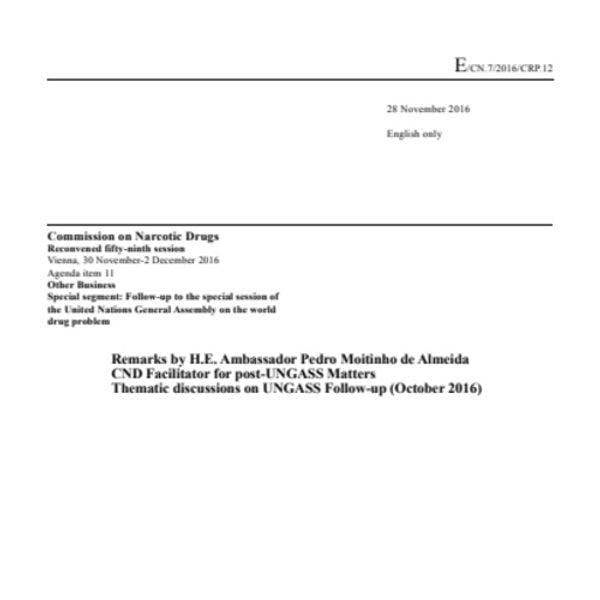Thematic discussions on UNGASS follow-up
1. On 19 April 2016 the General Assembly adopted the outcome document of its special session on the world drug problem (resolution S-30/1). In the outcome document, Member States resolved to take the necessary steps to implement the operational recommendations contained in the document, in close partnership with the United Nations and other intergovernmental organizations and civil society, and committed to share with the CND timely information on progress made in the implementation of these operational recommendations.
2. Following the adoption of the UNGASS outcome document, the CND has initiated an intensive follow-up process, based on the principles of comprehensiveness and inclusiveness, with all seven chapters of the UNGASS outcome document being dealt with equally, and ample opportunities being provided for all stakeholders to bring their expertise to the table, including UN entities and specialized agencies, international and regional organizations and civil society. A core part of that immediate follow-up process were the thematic discussions held in October 2016 on each of the seven chapters of the UNGASS outcome document, following a decision taken by the CND at its intersessional meeting on 8 September.
3. The thematic discussions, held on 10-11 and on 27-28 October 2016, provided Member States, UN entities and specialized agencies, international and regional organizations and civil society, including non-governmental organizations, with the opportunity to share experiences, lessons learnt and to inform about concrete activities on translating the UNGASS operational recommendations into action.
4. Short introductory remarks for each of the seven thematic chapters were made by UNODC, as the leading entity in the United Nations system for addressing and countering the world drug problem. Representatives from the Office of the High Commissioner for Human Rights (OHCHR), the World Health Organization (WHO) and the International Narcotics Control Board (INCB) participated in the meetings and made presentations on their respective work. Non-governmental organizations from Colombia, Mexico, Thailand, Côte D'Ivoire, United Republic of Tanzania, UK, Indonesia, Bolivia and other countries, whose participation was coordinated through the Vienna NGO Committee on Drugs, made presentations in person or addressed the Commission via video message.
5. In line with the approach taken in the preparatory process leading up to UNGASS, the CND thematic discussions were webcast, allowing all interested stakeholders to follow the deliberations.
Keep up-to-date with drug policy developments by subscribing to the IDPC Monthly Alert.
